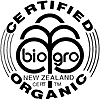1st IFOAM Conference on Animals in Organic Production Advances Global Organic Livestock Sector
St. Paul, Minnesota, August 27th 2006 -
From August 23rd to 25th, over 250 of the world's leading organic livestock experts from 24 countries joined together for the 1st IFOAM International Conference on Animals in Organic Production at the University of Minnesota's Continuing Education and Conference Center.
Jim Riddle, the University of Minnesota's Organic Outreach Coordinator and conference coordinator, said, "The University of Minnesota was honored to host this historic event, which brought together top organic livestock researchers and producers from around the world. The exchange of information was incredible, and the impacts of this conference will be felt for years to come."
The conference came to diverse signficant scientific conclusions that are crucial for both organic and conventional livestock sectors. Significantly, one study presented at the conference by Dr. Taradon Lunangtongkum concluded that resistance to important antibiotics for human health - fluoroquinolones - had been developed by the highly pathogenic Campylobacter jejuni species of bacteria in 46% of conventionally raised chickens and 67% of conventional turkeys respectively, whereas less than 2 % of the organically raised chickens and turkeys exhibited resistance to these important antibiotics. The presentations arrived at many conclusions that demonstrate that organic livestock systems improve both animal and human health while protecting the environment. To purchase the complete proceedings of the conference, visit:
http://shop.ifoam.org/bookstore/
Dr. Temple Grandin, noted author of Animals in Translation and other important works and keynote speaker at the conference emphasized that "people need to wake up to the sensory-based thinking of animals. Organic Agriculture is postitioned to create a new model of agriculture based upon Principles that are diametrically opposed to industrial agriculture.... Humans can no longer regard themselves as somehow separate from the ecosphere of which they are an integral part. In terms of organic standards and animal welfare we have to make sure that sick animals get treated in organic systems."
The participants of the conference collaboratively developed and issued the St. Paul Declaration, which recognizes that animals are sentient beings, expresses a committment to the Principles of Organic Agriculture that ensure the inclusion of animal welfare and animal health management as integral components of organic food and fiber production systems, and concludes that animals should be provided with the conditions and opportunities that accord with their physiology and natural behavior. The St. Paul Declaration calls for financial and institutional support to expand research and extenstion on organic animal production and management systems, calls on the business and investment community to participate in the sustained economic development of the organic livestock sector and acknowledges the role of organic standards in achieving tangible outcomes for animal health and welfare.? The complete text of the St. Paul Declaration can be accessed via the IFOAM website at:
http://www.ifoam.org/press/positions/St.Paul_Declaration.html
Sponsors for the conference included Organic Valley, Newman’s Own Organics, Northland Organic Foods, Stoneyfield Farm, Indian Herbs, Horizon Organic, Aurora Organic Dairy, FiBL – Research Institute of Organic Agriculture, MOSES – Midwest Organic and Sustainable Education Services, Organic Choice, OTA – Organic Trade Association, Sunrich/SunOpta, Crystal Creek, the Minnesota Department of Agriculture, and the University of Minnesota.
Delicious local organic food was served throughout the conference, with donations from Gardens of Eagan, Organic Valley, Stoneyfield Farm, Horizon Organic, Nancy’s Organic Yogurt, The Wedge, French Meadow Bakery, Coop Partners Warehouse, Frey Organic Vineyards, Pastureland Dairy, Peace Coffee, and Cornercopia, the UMN’s Student Organic Farm on the St. Paul campus.
IFOAM is the international umbrella organization of Organic Agriculture movements worldwide.
IFOAM’s mission is leading uniting and assisting the organic movement in its full diversity.
Our goal is the worldwide adoption of ecologically, socially and economically sound systems that are based on the Principles of Organic Agriculture.
IFOAM Press Release, Responsible: Angela B. Caudle, Contact: Neil Sorensen
Head Office Contact
Charles-de-Gaulle-Str. 5
53113 Bonn, Germany
Tel: +49-228-92650-10
Fax: +49-228-92650-99
Email: headoffice@ifoam.org
http://www.ifoam.org
















